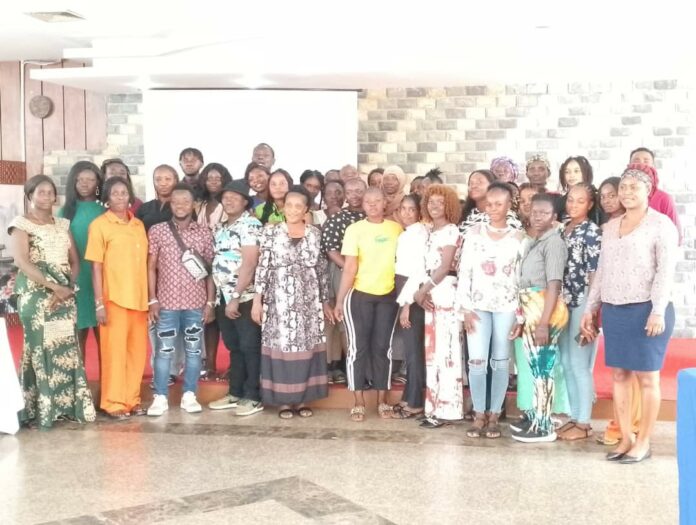TROCAIRE engages female leaders on leadership and social accountability in Sierra Leone in a three-day training workshop on Monday, 15th January, 2024 at the Bintumani Conference Centre at Aberdeen in Freetown.
As a way of expressing gratitude to TRONCAIRE, some Sierra Leonean women applauded TROCAIRE Sierra Leone on the three-day training workshop on leadership and social accountability. An idea that is pivotal to women in general because it has to do with women empowerment. The training was courtesy of a project titled “gender equality and social accountability through a strengthened civil society organization in Sierra Leone,” and it is co-funded by the European Union (EU).
The Lead facilitator for the training sessions was Reverend Alusine Diamond Suma. He engages and enlightened the women informing them that advocacy is a process and a journey, but not a day activity.
On that note, he encouraged the women to endure on their advocacy drive. Suma further educated the women on advocacy canvass, analysis and planning for advocacy campaigns.
Reverend Suma also educated the women on how to identify targeted individuals for whom one may want to advocate on their behalf, noting that it is the blueprint that is much more research oriented. The facilitator also apprised the women on the types of advocacy which according to him can be either confrontational or collaborative. He also lectured the women on how to develop an advocacy plan.
Reverend Suma delved into the rationale for advocacy and the right timing for advocacy. Among other things, Suma expounded on various areas that are worth mounting advocacy on, such as: democratic governance, human rights and social justice, effectively service delivery, community empowerment and policy change.
Participant and Project Officer, SEND Sierra Leone, Grace Stephens remarked that the training is crucial to the work that her NGO does, for she is of the view that it will strengthen them to carry out their activities which she said are mostly advocacy-based activities.
Zonal President, Young Women in Governance Network, Rabiatu Jalloh, expressed her appreciation to TROCAIRE for the training opportunity.
European Union (EU) Project Coordinator, TROCAIRE, Elizabeth Agatha Musah revealed that the “gender equality and social accountability through a strengthened civil society organization in Sierra Leone,” is a two years six months’ project that is expected to end in June 2025.
Musah emphasized that the project is being implemented in three districts such as Bombali, Kambia and Western Area Rural. She added that there are three local organizations that are implementing the project. “With the empowerment and capacity, it could influence their voices and their participation in governance and leadership, particularly the three districts that they operate.’’ According to her, these women serve as role models and lead the awareness raising campaign on issues bordering the women in their respective communities.
Musah opined the need to strengthen the voice of women ‘in advocacy and to hold leaders accountable, create social media content development so as to enable them communicate the knowledge gained, etc.
Women’s Empowerment Lead at TROCAIRE, Sudie Austina Sellu told Awoko Newspaper that the training borders on leadership and social accountability, adding that the intention behind the training is to capacitate women in advocacy and social accountability. Madam Sellu emphasized the need for these women to put into practice that which they have learnt during the training exercise, noting that there are a lot of things that women and girls are in need of, hence, the need to advocate for these things. Unfortunately, Madam Sellu is of the view that most women do not have the guts to speak out on these issues, hence, the need to prepare them for better advocacy by asking questions on what should be done. “This training is crucial for them to understand the issues and the methodologies aimed at tackling these issues,” she added.
Looking at the broader picture, Sellu recounted that TROCAIRE has had numerous interventions, such as social, economic and protection of women on issues around sexual and gender-based violence (SGBV).
In terms of impact, Sellu is of the view that their interventions have had a huge impact in their areas of operations (North and North-West of Sierra Leone). She mentioned that they participated in the enactment of the Gender Equality and Women’s Empowerment (GEWE) Act and the enactment of the Land Rights Act, which she described as women progressive. “We are always at the forefront of any law that is aimed at the emancipation of women in Sierra Leone,” she maintained. She assured of sustained women’s empowerment drive.
Considering the 35% quota provided by the Gender Equality and Women Empowerment policy, there is the need for women to be enlightened in many fields. Enlightening women on leadership and social accountability, which is germane to hold public officers to account on issues of national interest.


